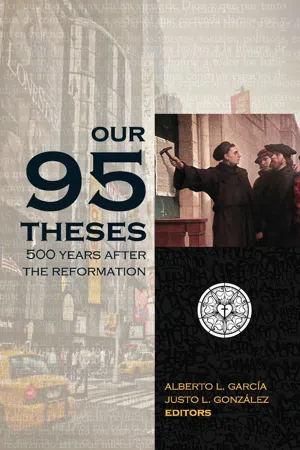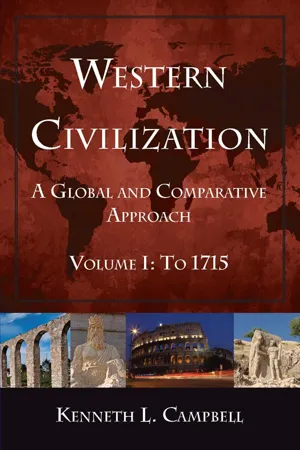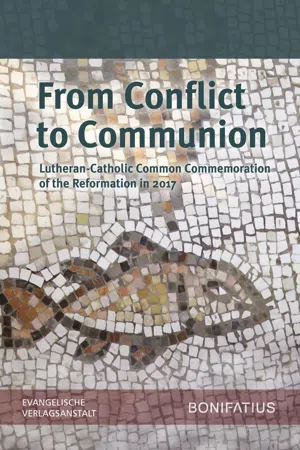History
Spread of Lutheranism
The spread of Lutheranism refers to the dissemination of the teachings of Martin Luther, a key figure in the Protestant Reformation, across Europe during the 16th century. Lutheranism gained traction due to factors such as the printing press, which facilitated the distribution of Luther's writings, and the support of various rulers who adopted the new religious movement.
Written by Perlego with AI-assistance
Related key terms
Related key terms
1 of 4
Related key terms
1 of 3
3 Key excerpts on "Spread of Lutheranism"
- eBook - ePub
Our Ninety-Five Theses
500 Years after the Reformation
- Alberto L. García, Justo L. González(Authors)
- 2016(Publication Date)
- Bestsellers Media(Publisher)
2. The legacy of the Reformationshows us the rich appropriation of the cultural focus of the Renaissance era in the study of the sources and classic texts, as well as the use of polyphonic music as sources that formed the impetus for the translation of the Bible into the language of the people and the use of polyphonic music in the congregational context. There are expressions of Lutheranism in some parts of the world that have learned to incarnate the spoken and heartfelt musical language of the people, taking into account at the same time the questions and worldview of that culture in the catechetical instruction.Nevertheless, in certain parts of Latin America we see Lutheranism as a German immigrant phenomenon that exists relatively isolated from the rest of the Latino population with its own aspirations and problems. Another form of aberration is to see Lutheranism in Latin America as a North American missionary movement that, though well intentioned, tends to form leaders whose language and thought processes tend to reflect the Lutheran churches of North America and not Latin America. For historical and cultural reasons, the Lutheran Church in the United States continues to be one of the churches with the lowest number of Latinos in the entire country. In the face of these challenges, the Lutheran Church has to rediscover its historic disposition toward incarnating in the culture of the people, rejoicing in and evangelically appropriating those cultural expressions that promote the teaching of the Word of God and life in community.3. Luther understands the functionof temporal government in the promotion of peace and order in the society as a gift of God. He also teaches that in the spiritual realm (that is of the Holy Spirit), God redeems his creation by means of the Gospel of justification. Luther distinguishes between the two kingdoms, yet relates them because the Christian lives by faith in this world and has to live out his or her vocation in this world. Nevertheless, the distinction between the temporal and spiritual kingdoms has been used to justify the status quo of the temporal government even when it is not functioning or does not take into account the welfare of significant parts of its population. As long as we assume that only the spiritual welfare within the spiritual kingdom is important, and are not concerned with what happens in everyday life, such an action can lead to a justification of injustices that affect the most vulnerable (or at least a lack of interest in their wellbeing). - eBook - ePub
Western Civilization: A Global and Comparative Approach
Volume I: To 1715
- Kenneth L. Campbell(Author)
- 2014(Publication Date)
- Routledge(Publisher)
Chapter 4 in Volume II). Both Catholics and Protestants relied heavily on logic and rational argument to defend their positions, regarding God as a being whose existence could be proved and demonstrated. Many Catholics and Protestants believed that two religions could not coexist within the same state, although in practice Catholics and Protestants in a number of local communities across Europe found a way to do just that. Both Catholic and Protestant rulers regarded religious uniformity as a prerequisite for political loyalty. Both persecuted religious minorities and feared countries with a different religion as real or potential enemies. Thus religion came to shape much of the political discourse that followed the Reformation.The Reformation had a number of social consequences, although these have been widely debated among historians. The Reformation was in some ways related to the development of a more individualistic society, though which was the cause and which the effect is a complicated matter. The Reformation offered alternative views on marriage, sexuality, education, the role of women in society, and poor relief. If the period did not fundamentally alter the patriarchal and hierarchical nature of European society, it both reflected and contributed to social changes that did affect the lives of individual men and women, especially in those lands most affected by the Reformation. Finally, because the Reformation movement coincided with a period of European exploration and overseas travel, the religious controversies of Europe were transported to the far corners of the globe within a relatively short period of time.1. What were the decisive factors and events leading to Martin Luther’s break with the Roman church?2. Discuss the social consequences of the Reformation. In particular, what impact did the Reformation have on women? Would attitudes have changed in this period independent of the religious changes that were occurring?3. - eBook - ePub
From Conflict to Communion – Including Common Prayer
Lutheran-Catholic Common Commemoration of the Reformation in 2017 Report of the Lutheran-Roman Catholic Commission on Unity
- The Lutheran World Federation, The Lutheran World Federation(Authors)
- 2016(Publication Date)
- Evangelische Verlagsanstalt(Publisher)
39. The term »Reformation« came to be used as a designation for the complex of historical events that, in the narrower sense, encompass the years 1517 to 1555, thus from the time of the spread of Martin Luther’s »Ninety-five Theses« up until the Peace of Augsburg. The theological and ecclesiastical controversy that Luther’s theology had triggered quickly became entangled with politics, the economy, and culture, due to the situation at the time. What is designated by the term »Reformation« thus reaches far beyond what Luther himself taught and intended. The concept of »Reformation« as a designation of an entire epoch comes from Leopold von Ranke who, in the nineteenth century, popularized the custom of speaking of an »age of Reformation.«REFORMATION FLASHPOINT : CONTROVERSY OVER INDULGENCES40. On October 31, 1517, Luther sent his »Ninety-five Theses,« titled, »Disputation on the Efficacy and Power of Indulgences,« as an appendix to a letter to Archbishop Albrecht of Mainz. In this letter, Luther expressed serious concerns about preaching and the practice of indulgences occurring under the responsibility of the Archbishop and urged him to make changes. On the same day, he wrote another letter to his Diocesan Bishop Hieronymus of Brandenburg. When Luther sent his theses to a few colleagues and most likely posted them on the door of the castle church in Wittenberg, he wished to inaugurate an academic disputation on open and unresolved questions regarding the theory and practice of indulgences.41. Indulgences played an important role in the piety of the time. An indulgence was understood as a remission of temporal punishment due to sins whose guilt had already been forgiven. Christians could receive an indulgence under certain prescribed conditions – such as prayer, acts of charity, and almsgiving – through the action of the church, which was thought to dispense and apply the treasury of the satisfactions of Christ and the saints to penitents.42.
Index pages curate the most relevant extracts from our library of academic textbooks. They’ve been created using an in-house natural language model (NLM), each adding context and meaning to key research topics.
Explore more topic indexes
Explore more topic indexes
1 of 6
Explore more topic indexes
1 of 4


